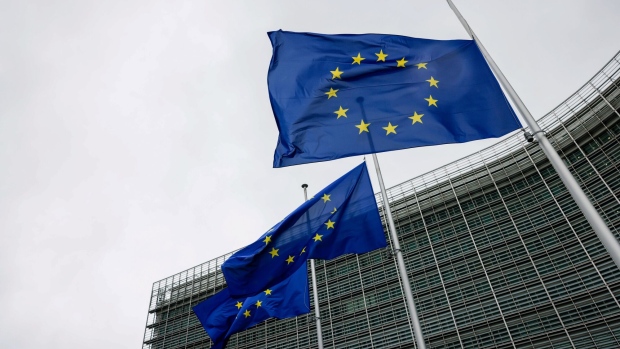Feb 21, 2024
EU Poised to Release Polish Aid Blocked in Rule of Law Clash
, Bloomberg News

(Bloomberg) -- The European Union is poised to approve the release of €6.3 billion ($6.8 billion) in post-pandemic aid to Poland as early as next week in a major vote of confidence in the new government’s ability to mend ties with Brussels.
The European Commission is set to accept a package of recent political commitments as sufficient to trigger the first payment from almost €60 billion in grants and loans that have remained blocked over rule-of-law concerns, according to people familiar with the discussions who spoke on condition of anonymity.
A positive EU decision would be a boost for Prime Minister Donald Tusk, whose coalition was propelled to victory in October elections on a promise to improve relations with European allies and to end democratic backsliding after eight years of populist rule.
The EU has so far refused to release Poland’s share of the bloc’s post-pandemic aid until it meets a series of conditions, or milestones, that focus on reversing controversial changes in the judiciary introduced by the previous administration.
Read More: EU Gives Cautious Welcome to Polish Blueprint on Rule of Law
A final decision hasn’t yet been taken as officials are still ironing out details, the people said. The EU’s executive is assessing the first payment request it received from Warsaw and expects to present its assessment soon, the commission’s spokesperson said in response to questions from Bloomberg.
The zloty reversed losses after the news broke in late trading on Wednesday and was little changed at 4.3139 per euro at 7:24 p.m. in Warsaw.
Once approved by the Commission, the decision would still need a sign-off from EU member states, meaning the actual payments could come at a later date.
The approval of post-pandemic aid would also ultimately pave the way for unlocking an additional €76 billion in cohesion funds for Poland, the people said.
The judicial reforms have been at the heart of a bruising conflict between Brussels and Warsaw that has triggered legal procedures and hundreds of millions in euros in fines.
But reversing the changes is an arduous task without the backing of President Andrzej Duda, a staunch ally of the previous government who has veto power over legislation. Duda approved the majority of the controversial judicial reforms and has called several of the new government’s moves illegal and pledged to block them.
In an attempt to avoid a veto, Tusk’s cabinet has put in place several temporary solutions to meet the conditions for the release of the funds. They include effectively taking control of a contested regime for disciplining judges by officials appointed by the justice minister. The new government has called on judges to respect the primacy of EU laws in their rulings.
It has also applied to join the EU’s Public Prosecutor’s Office in a move that would give Brussels a role in investigating and prosecuting crimes against the bloc’s financial interests within Poland.
Separately, Polish ministers traveled to Brussels this week to present the commission with a road map that lays out a tight work schedule on several draft bills, including changes within Poland’s key judicial bodies, to end the so-called Article 7 procedure against the EU’s biggest eastern member.
Imposed in 2017, it could have ultimately led to the suspension of voting rights for Poland.
--With assistance from Maciej Martewicz.
(Adds details about the disbursement in seventh paragraph.)
©2024 Bloomberg L.P.







